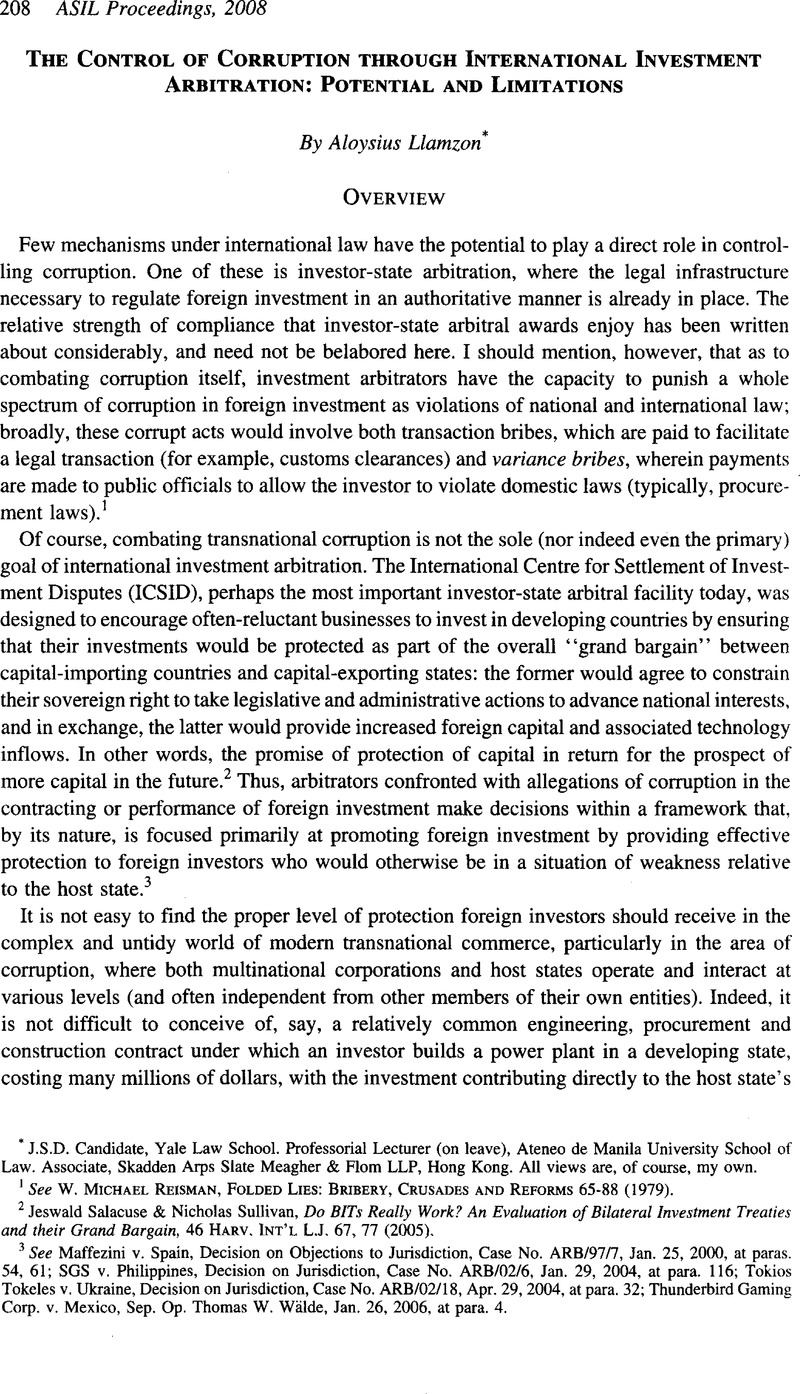Article contents
The Control of Corruption through International Investment Arbitration: Potential and Limitations
Published online by Cambridge University Press: 28 February 2017
Abstract

- Type
- International Law and the Fight Against Corruption
- Information
- Copyright
- Copyright © American Society of International Law 2008
References
1 See W. Michael Reisman, Folded Lies: Bribery, Crusades and Reforms 65-88 (1979).
2 Salacuse, Jeswald & Sullivan, Nicholas, Do Bits Really Work? An Evaluation of Bilateral Investment Treaties and their Grand Bargain, 46 Harv. Int’l L. J. 67, 77 (2005)Google Scholar.
3 See Maffezini v. Spain, Decision on Objections to Jurisdiction, Case No. ARB/97/7, Jan. 25, 2000, at paras. 54, 61; SGS v. Philippines, Decision on Jurisdiction, Case No. ARB/02/6, Jan. 29, 2004, at para. 116; Tokios Tokeles v. Ukraine, Decision on Jurisdiction, Case No. ARB/02/18, Apr. 29, 2004, at para. 32; Thunderbird Gaming Corp. v. Mexico, Sep. Op. Thomas W. Walde, Jan. 26, 2006, at para. 4.
4 World Duty Free Company Ltd. v. The Republic of Kenya, Award, ICSID Case No. ARB/00/7, Oct. 4, 2006.
5 These include:
-
(1)
(1) Tanzania Electric Supply Company Limited v. Independent Power Tanzania Ltd. (Award, ICSID Case No. ARB/98/8, July 12, 2001), which involved a dispute over a Power Purchase Agreement entered into between the state power company and the investor. The state power company alleged that the investor paid gifts to some of its officials and that it was thus entitled to rescind the agreement on the basis of bribery. The Tribunal dismissed the bribery allegations and upheld the effectivity of the contract, noting that the only sum admitted to have been paid and not rejected was the equivalent of a less than $200 “holiday gift package” given to a state corporation official. This $200 was alleged by the state company to have succeeded in getting the assistance of the official to support the investor’s project. The tribunal ruled that there was no evidence to suggest either that (i) but for the alleged bribe, the official would have cast any vote or used any influence against the project, or (ii) that the official’s support was crucial or indeed made any difference.
-
(2)
(2) In Lucchetti v. Peru (Award, Case No ARB 03/4, Feb. 7, 2005), the claimants submitted that they obtained all necessary permits for construction of an industrial plant, but the Municipality of Lima annulled the permits, basing the annulment of the permit on environmental problems and deficiencies in the granting of the permits. Peru alleged that local court judgments that allowed the investors to continue doing business despite local government regulations that called for them to stop operations were procured through bribery. While the Tribunal stated that bribery, if proved, would provide an independent ground that may ultimately affect the outcome of the case, they declined to rule on the issue, stating that because the Tribunal had already concluded on ratioae temporis grounds that they lacked jurisdiction over the dispute.
-
(3)
(3) In Methanex Corporation v. United States of America (Arbitration under Chapter 11 of NAFTA and the UNCITRAL Arbitration Rules, Final Award, Aug. 7, 2005), it was the Claimant that claimed corruption. Specifically, the investor alleged corruption of California government officials (including then Governor Gray Davis) in ordering a ban to the use of MBTE (of which Methanex produced a major component—methanol) in the State of California for environmental and human health reasons. The Tribunal found the allegations of corruption to be unfounded as the legislative process had been transparent and subjected to due process and peer review, and thus did not overturn the findings of the California legislative process, but importantly, made significant efforts to investigate corruption allegations. The court used the “connect-the-dots” approach—drawing logical inferences from the facts.
6 International Thunderbird Gaming Corp. v. Mexico, Arbitral Award, ICSID Case No. Jan. 26, 2006.
7 Inceysa Vallisoletana S.L. v. Republic of El Salvador, Award, ICSID Case No. ARB/03/26, Aug. 2, 2006.
- 3
- Cited by




